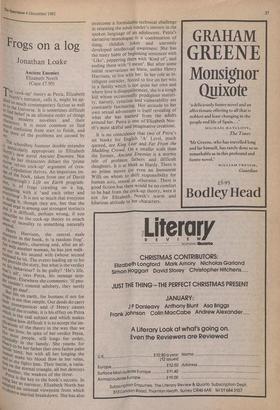Frogs on a log
Jonathan LOake
Ancient Enemies Elizabeth North (Cape £7.95)
e 'cock-up theory as Petra, Elizabeth North's narrator, calls it, might be ap- Plied to much contemporary fiction as well 4t, Li 1,° the Universe. It is sometimes difficult belief in an ultimate order of things modern novelists and their rrin-rra,cters. It is more common to find th—al Confusion from start to finish, and exat. Most of the problems are caused by is The schoolboy humour double entendre N °Particularly appropriate to Elizabeth oh,411's new novel Ancient Enemies. Not ai"Y do her characters debate the 'prime no°ver versus cock-up' argument of crea- 41,1' CoPulation thrives. An important im- " the book, taken from one of David Inttenborough's Life on Earth program- es, is of frogs crawling on a log, 'ev°Pulating With it 'and each other and is erirY,(hing'. It is not so much that everyone se:c'ing it, though they are, but that the urge is among our strongest instincts stibq it is difficult, perhaps wrong, if you scribe to the cock-up theory to attach an, °f morality to something naturally ellienrY Harrison, the central male lie- iraeter in the book, is 'a random frog'. fai s energetic, charming and, after an af- r with another woman, he has just walk- hus°but on his second wife (whose second his 0 h4ild h1s he is). The events leading up to on k',rovide the story, but what is the verdict tha 'us behaviour? Is he guilty? 'He's life, all', says Petra, his teenage step- Di ognter. Elsewhere she comments: `If peo- tlc°dn't commit adultery, they surely ild go mad'. frs life on earth, for humans if not for tiler' is not that simple. Our deeds do carry rnu'r, consequences and if Henry causes Which iFu of the trouble, it is his effect on Petra 4,s the real subject and which makes phr,'ealise how difficult it is to accept the im- live-ati°ns of the theory in the way that we like °I-Ir lives. In spite of her verdict Petra, esi),, ost people, still longs for order, lieh`clallY in the family. She yearns for beside to be her father (her own father pales eant,,e, him.), but with all her longing she Make his blood flow in her veins, tion s° she fights him. Their battle, a varia- her- on the eternal triangle, all but destroys pe.Th,c)ther, the weakest of the three. asin—ri is the key to the book's success. In ado g iler as narrator, Elizabeth North has to orbited an unusual viewpoint from which serve marital breakdown. She has also overcome a formidable technical challenge in retaining the adult reader's interest in the spoken language of an adolescent. Petra's narrative/monologue is a combination of slang, childish jokes and unevenly developed intellectual awareness. She has the nasty habit of beginning sentences with 'Like', peppering them with 'Kind of', and ending them with 'I mean'. But after some initial reservations we learn, unlike Henry Harrison, to live with her. In her role as in- telligent outsider, forced to live on her wits in a family which is not quite her own and where love is disappointment, she is a tough kid whose occasionally prodigious maturi- ty, naivety, cynicism and vulnerability are constantly fascinating. Her attitude to her own sexual adventures is itself revealing of what she has learned from the adults around her. Petra is one of Elizabeth Nor- th's most skilful and imaginative creations.
It is no coincidence that two of Petra's set books for English 'A' Level, much quoted, are King Lear and Far From the Madding Crowd. On a smaller scale than the former, Ancient Enemies is a stormy tale of problem fathers and difficult daughters. It is as bleak as Hardy. There is no prime mover (oreven an Immanent Will) on whom to shift responsibility for human acts, sexual or otherwise. There is good fiction but there would be no comfort to be had from the cock-up theory, were it not for Elizabeth North's warm and hilarious attitude to her characters.










































 Previous page
Previous page